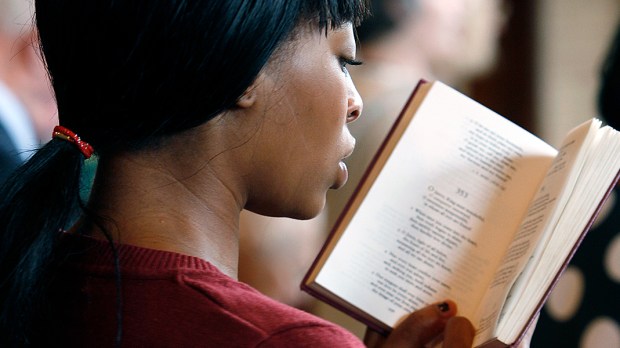How would you respond to this claim?
There is only one right way to pray the Psalms—and that is to pray them repeatedly.
Monastics I know would nod and smile and high-five each other. An essential element of their lives is to punctuate their day with the sung recitation of the Psalms, which is known as the Divine Office or the Liturgy of the Hours. “Seven times a day I praise you,” (Psalm 119:164) is a verse of Scripture that monastic communities take literally. That is why their daily order thrives on routine and predictability. Morning Prayer is at this time; Evening Prayer is at that time, etc. That is an admirable way of life, perhaps even enviable, from a certain point of view—but it is a way of life that is not accessible to everyone.
My friends with young children, my friends who are health care providers, my friends who are lawyers—they all tell me that reliable predictability, a schedule set in stone, is not (and almost certainly cannot) be part of their lives. I understand that. What is the implication of that fact for those who wish to pray the Psalms faithfully, as part of Our Lord’s mandate to “pray always and not lose heart”? (Luke 18:1)
While not everyone can pray according to a monastic schedule, every Christian should develop the habit of praying with the Psalms, according to the circumstances of their lives. I wish to recommend here a simple way of praying with the Psalms that can help us to return to the Psalms frequently, even if we cannot lock such prayer into our daily schedules.
Whenever you pray with the Psalms, I suggest that you pray the Psalm three times: (1) first, pray the Psalm with Israel; (2) second, pray the Psalm with Christ; (3) third, pray the Psalm with the Church.
The Psalms constituted the prayer book of Israel. If you would know the heart and history of Israel, turn to the Psalms. Let’s look at a few verses from Psalm 16:
Protect me, O God, for in you I take refuge.
I say to the Lord, “You are my Lord;
I have no good apart from you.”
As for the holy ones in the land, they are the noble,
in whom is all my delight.
Those who choose another god multiply their sorrows;
their drink offerings of blood I will not pour out
or take their names upon my lips.
Israel is surrounded by pagan cults that are offering blood sacrifices to idols and demons. The faithful people of Israel rightly recoiled from such false worship. Their most cherished prize is their fidelity to their covenant with the one true God. Apart from that covenant, they are not Israel.

Read more:
If you need hope, foster your “Christian memory,” says Francis
Remember that the Psalms also constitute the prayer book of Christ. He would have known by heart all of the Psalms. He prayed them in union with Israel, and he prayed them as an expression of his unique relationship with our Heavenly Father. Let’s continue with Psalm 116, and imagine Christ praying these words during his suffering:
Therefore my heart is glad, and my soul rejoices;
my body also rests secure.
For you do not give me up to Sheol,
or let your faithful one see the Pit.
Surely, these words, part of Christ’s heritage, and emblematic of his saving mission, must have been on his lips and feeding his heart, even during the terrible sufferings of his Passion. The Psalms declare that God can only be faithful to his people, and he will surely be faithful to his Christ.
In that light, now let’s turn to Psalm 116 again, and pray the words of the Psalm in union with the Church:
I bless the Lord who gives me counsel;
in the night also my heart instructs me.
I keep the Lord always before me;
because he is at my right hand, I shall not be moved.
You show me the path of life.
In your presence there is fullness of joy;
in your right hand are pleasures forevermore.
Around the world, the Church at this moment is undergoing terrible trials—persecution, scandals, confusion. A habit of praying repeatedly the Psalms will help a struggling member of the Church to pray in, with, and for the Church. The words of this Psalm can help to remind suffering members of the Church that God remained true to Israel, remained true to his Christ, and will remain true to the Bride of Christ who is the Church.
At least once per day, take up a Psalm, and pray it three times, with Israel, with Christ, and with the Church. And see for yourself that God is faithful.
When I write next, I will speak of the wisdom of the saints. Until then, let’s keep each other in prayer.

Read more:
A beginner’s guide to the Liturgy of the Hours

